
Summer 2022 – Volume 62, Issue 2
Editor: Erinn C. Cameron
Editorial Team: Polli Hagenaars, Ada Sinacore, Merry Bullock, Patrick A. Robertson
Message from the President
ICP News and Activities
- Webinars
- Conferences
- Interest Groups
- ICP Health Psychology Interest Group Webinar: Health Equity In and Out of the Pandemic
Behind the Scenes – from the Secretariat
Member Spotlight
- Jonathan H. Ogilvy
- Dr. Stephen Baffour Adjei
- Patrick A. Robertson
Member News, Announcements, and Comments
ICP at the United Nations
- Moving Forward: The NGO Committee on Migration
Member Special Interest Pieces
- Article Briefs
- Migration in Context: Micro-Credential Offers Transformational Experience Through Service-Learning Projects
- International Psychology Book Series
Student Corner
- ICP Student Interns at the United Nations
Art & Poetry Corner
- Uncertain Cartographies: Climate change and the Artwork of Gonzalo Bacigalupe
Remembrances
Note from the Editor
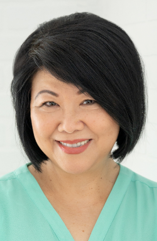
The relevance of human rights issues in psychology is increasingly evident as we witness the issues that continue to face the world today. Psychology has yet to definitively delineate what a “human rights psychology” field looks like, but it is only a matter of time before it takes a recognizable shape. Even so, several organizations are paying attention to human rights issues. The ICP continues to carry out its work on psychology and human rights, and to collaborate with other organizations on global issues.
Since I last wrote for the Newsletter about 3 months ago, I am happy to say that the ICP is on track with its multiple activities to carry out its vision. We keep our membership informed with the monthly ICP News and Updates. If you have comments or questions, we would be delighted to hear from you. You can always reach us at icpincinfo@gmail.com.
We are currently having elections for the President-Elect and three Directors-at-Large positions. Do you know of someone, including yourself, who might be good candidates for the Board? If yes, please do nominate them.
The planning for the ICP2022 annual conference is proceeding well. It will again be in virtual format because the course of the pandemic is unpredictable. Please save the dates December 9-11 for the conference. We received super positive feedback about our ICP2020 and ICP2021. We intend to make our ICP2022 just as interesting if not more. Do visit the conference website at https://icpweb.org/icp-annual-conference/icp2022/ for more information and to register.
Machiko Fukuhara and Naoki Asazuma are organizing the Japan regional meeting July 9-11 which is also in virtual format. Please visit https://icpweb.org/icp-regional-conference-japan-july-2022/ for more information and to register.
The ICP regularly sends out announcements for ICP webinars on a regular basis for your interest and professional development. Registration is free, so please take advantage of them.
Don’t forget that we have interest groups that you can still join – check them out at https://icpweb.org/interest-groups/. It is a great way to network with colleagues of similar interests.
The ICP relies almost exclusively on membership dues for its expenses. So please do send in your membership dues if you have not done so already. We appreciate your support.
The ICP does not exist without the volunteer work of its members who serve on the Board and various committees. These individuals contribute their skills, knowledge, talent, and valuable time despite having other responsibilities. We are deeply grateful to all of them. I think that what they are doing can genuinely be called a labour of love.
This brings me to the question of why several of us are serving on the ICP. I cannot speak for others, as I can only speak for myself. I think that in our world that seems to be increasingly tumultuous with every passing day, the regional and global crises all seem to be beyond repair. We look to leaders to tackle our problems, and we wait, and are often disappointed. However, we often forget that we ourselves can make things better on our own. What we do in our teaching, our research, our practice, our publications, our advocacy efforts, our committee work, and even in our personal lives can make a difference. It might start with a very small difference but as it ripples out, the effect is amplified. So, serving on the ICP can give us an added sense of meaning to our work because of its focus on human rights and justice. It also gives us a sense of community where we are all pulling in the same direction to make things better in this world.
The saying “Be the change you wish to see in the world” is attributed to the great Mahatma Gandhi. So, before I end this message, I wish for every single one of us to be the change we wish to see in the world, and not be distracted by the constant bombardment of negative news and predictions of doom. I wish the light in you to shine brightly so that the changes you make will ripple out and make a positive difference through time and space. Stay well, everyone.
Josephine Tan, ICP President
Webinars
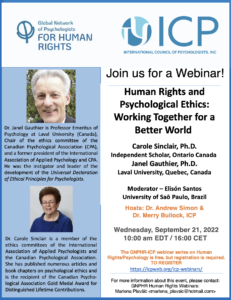
September 21, 2022 10:00am EDT/4:00 pm CET
Janel Gauthier & Carole Sinclair – Human Rights and Psychological Ethics – Working Together for a Better World
Register Here: https://us02web.zoom.us/webinar/register/WN_GEZZbzlvRsCEU67b69qAMA
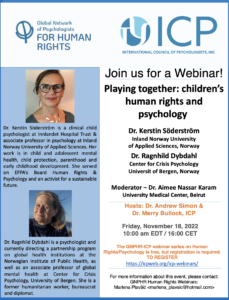
November 18, 2022 10:00am EST/4:00 pm CEST
Kerstin Søderstrøm & Ragnhild Dybdahl – Playing Together: Children’s Human Rights and Psychology
Register Here: https://us02web.zoom.us/webinar/register/WN_5MxRaA8bTwipDVbE6mwzng
You can view recordings of ICP webinars and register for upcoming webinars at https://icpweb.org/icp-webinars/
Future ICP webinars:
Transnational Feminism and Psychology by Natalie Porter & Tugce Kurtis September 2022
Cross-Cultural Peer Review: Seminar and Workshop , October 2022
ICP in the News



Conference Co-chairs Dr. Machiko Fukuhara and Dr. Naoki Asazuma organized a regional meeting that highlighted aspects of psychology in Japan and introduced ICP interest groups to foster synergy and collaboration. You can see the conference program here.
Conferences
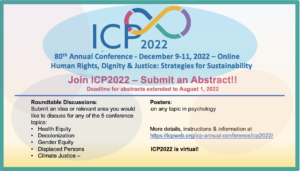
- ICP2022 – Annual Conference will be virtual and held December 9-11, 2022. Submission Deadline August 31st, 2022. Information about the conference can be found https://icpweb.org/icp-annual-conference/icp2022/
Interest Groups
ICP interest groups address diverse human rights topics of international interest. More information about these groups can be found https://icpweb.org/interest-groups/
Current interest groups:
- Decolonizing Psychology, chairs Polli Hagenaars, Élison Santos, & Naomi Koerner
- Latin America & Caribbean Psychology, chairs Naomi Koerner, & Élison Santos
- Health Psychology & Human Rights, chairs Swati Bajpai, Elaine Congress, & Amina Muazzam
ICP Health Psychology Interest Group Webinar: Health Equity In and Out of the Pandemic
Katie Kurnick, Graduate Candidate of Social Work, University of Michigan
On June 8, 2022, The International Council of Psychologists (ICP) hosted a webinar titled “Health Equity In and Out of the Pandemic” where two experts, Vera Araujo Soares- Faculty of Behavioral, Management & Social Sciences, University of Twente and Urmi Nanda Biswas- Ahmedabad University, India shared their views of health equity, with a specific emphasis on the impact of COVID-19. This webinar was hosted by Andrew Simon- Chair of Webinar Committee, and moderated by Elaine Congress, Amina Muazzam, and Swati Bajpai and is the first of a webinar series presented by ICP on global health equity. A main goal of ICP is to advance the UN Sustainable Development Goal 3 (SDG 3) which focuses on good health and wellbeing.
Professor Soares presented on Psychology and Equity, where she started the presentation explaining the differences between health equity and health inequality. She noted that health equity is achieved when everyone can attain their full potential for health and well-being and that health inequalities are systemic variations in health variables according to social and demographic variables. These exist at various levels, and health equity is linked to public health spending. An additional large emphasis was placed on modifiable determinants of health, including social and environmental factors that impact healthcare access.
Since health inequalities are related to health psychologists, what can psychologists do to address them? Interventions at the community level have an impact and can make a difference. There is a need to intervene at multiple levels simultaneously and consistently. Professor Soares suggests starting with the social position of an individual and analyzing their access to health, education, etc. This all has an impact on the environment they live in, and this has an impact on overall health of the individual.
Some examples of the role of health psychology in public health include, investigating determinants of health, defining the mechanisms of action, developing logic models, and developing dark logic models. Professor Soares did research in the UK on interventions, and she found that just providing information is not effective. The best method was to incentivize change. They used foodscape interventions- changing salt shakers to let out less salt, and presenting smaller meal sizes sold in boxes. They also utilized MapMe to reduce child obesity.
Professor Soares included areas to avoid in studies (these will increase inequalities) such as educational components, relying on voluntary change, takin a “one size fits all” approach, and being financially regressive (advantage to the richest). She encouraged the implementation of the following areas to include in research (these will decrease inequalities) compulsory, opt out rather than opt in, tailored to individual, and financially progressive (advantage to the poorest).
She ended with answering the question of what can psychologists do to reduce the burden of disease on vulnerable populations? Her position was to advocate, practice, adapt, promote, educate/train, science/research, and disseminate information.
Urmi Nanda Biswas presented on the topic of her research during the COVID-19 pandemic. She noted that COVID-19 has put stress on public health systems globally and has exposed the inequities in healthcare for vulnerable populations. Biswas suggests focusing on health systems preparedness for protecting the health of all society in the context of social determinants of health. Psychologists have a role in this in the preparedness area. Healthcare infrastructure is currently not prepared for another global pandemic, but focusing on core competencies could create more equity and increase preparedness for healthcare systems. Creating robust and resilient public health infrastructure during “normal” times helps prepare the healthcare system for a public health emergency.
COVID-19 has had a tremendous psychosocial impact on our world. The pandemic has increased susceptibility of vulnerable populations, it has augmented uncertainty, anxiety, and depression. Due to the economic toll the COVID-19 pandemic has had on the world, there is an increase in unemployment and a lack of long term employment opportunities, as well as reverse migration. We have also seen vaccine hesitancy, increases in domestic violence, financial burdens, and psychological stress; all taking a large toll on the psychosocial health of the individual.
What is the role of health psychologists? Professor Biswas suggests that health psychologists be a leading force for compliance and adherence to health protective behavior, getting vaccinated and encouraging others to get vaccinated. What was particularly emphasized was standardizing messages around public health protocols and educating the public on the importance of trusting these messages. This includes showing the public that the risks exist and to take them seriously. Biswas talks about the importance of audience segmentation using the risk perception attitude framework when talking about how to educate the public about health issues.
From her research, Professor Biswas shared four studies on health equity she did in 2020 with various populations: the general public, the elderly, immigrants, females, and the LGBTQ+ community.
Study 1 focused on health beliefs and perceptions will significantly impact self protected behaviors. The results showed that there is a difference in perceived self-efficacy and perceived general health amongst various groups. Perceived self-efficacy and perceived barriers predicted perceived general mental health.
Study 2 focused on the response of the eldercare system in India to COVID-19. The findings indicated that the eldercare institutions became self-contained communities, thus ensuring the safety of the elderly during this time. Some challenges included: transportation of workers, facilities acquiring food and medicines, and staff shortages.
Study 3 looked at Indian female migrants and their work opportunities during the pandemic, specifically in Canada. A particular challenge here was VISA issuance. The impacts of the pandemic included changing domestic tasks, changing work life, loss of social support, and mental health struggles.
Study 4 was about the LGBTQ+ community and health seeking behavior. The study found that many LGBTQ+ individuals rely on the public healthcare system for care, where they may face discrimination and/or judgement. There is also limited mental health literacy due to lack of educational opportunities. Many transgender individuals are assumed to be sex workers and may face greater discrimination.
Professor Biswas emphasizes the importance of the relationship between assessment, policy development, and assurance when advancing health equity. What can psychologists do to address health equity? Biswas suggests implementing strategies through research and intervention. Specifically addressing: audience segmentation and risk communication, focusing on vulnerable groups and their specific needs, reimagining the role of psychologists, looking at the bigger picture (globally), digitizing the health interventions, and ensuring the public can access these interventions.
In conclusion,, the expert speakers addressed questions about challenges in the health equity space impacting specific populations. There are many structural, environmental, and socio-economic barriers to finding good nutrients and adequate healthcare. Professor Biswas discoursed about vaccine hesitancy, citing that migrants did not have access to accurate information about vaccines. Professor Soares suggested that the role of psychologists is to advance power and equity in healthcare, address psychosocial risk factors will improve health equity, and employ more multicultural psychologists to implement more dynamic interventions that address social justice and anti-racism. The two speakers came with a plethora of knowledge about health equity in the COVID-19 pandemic, and presented many viable ways that psychologists could get involved in addressing these challenges. The ICP special interest group will continue this series on health equality and equity through future webinars from global practitioners.
See a recording of the webinar here
Other
Recognize colleagues doing international work by nominating them for an ICP Award!!! The Nominations deadline has been extended until 31 August 2022.
-
- Distinguished contributions to international psychology in research and service (Fukuhara Award – https://icpweb.org/awards/fukuhara/)
- Research and service that directly benefits the health, promotion and well-being of women in the world: (Denmark-Gunvald Award – https://icpweb.org/awards/denmark-gunvald-award/)
- Member of the ICP who has a long and distinguished history of research or applied contributions to one or more international areas (Frances Mullen Award – https://icpweb.org/awards/frances-mullen-award/)
- Outstanding early career contributions to scholarly endeavors addressing psychological issues of a universal or multinational significance (Sukemune-Bain Award – students and ECPs are eligible – https://icpweb.org/awards/sukemune-bain-award/)
- Work being done by psychologists to advance Human Rights (Human Rights Award – https://icpweb.org/awards/human-rights-award/)
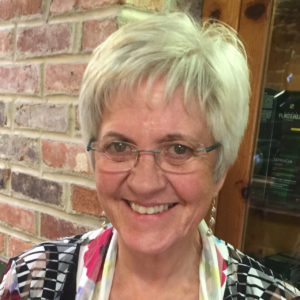
Report from the Secretariat
Dr. Merry Bullock, ICP Secretary- General
ICP Board Activities
The ICP Board as met three times this year so far, and will be meeting again in October. The central focus of these meetings has been on implementing ICP’s strategic plan. The strategic plan has three main sections: (1) to enhance ICP’s role as a catalyst and hub for discussion and networking; (2) to build resources for the future; and (3) to ensure that ICP’s infrastructure is poised to maximize member participation and engagement and to sustain leadership for the organization (you can see the strategic plan here (https://icpweb.org/about-us/icp-strategic-plan-2022-2026/).
Notable decisions from meetings thus far are the following:
- Institute a membership drive for 2022 – the initiative is called “Discover ICP” and invites colleagues to try us out with waived membership dues for 2022. Thus far, over 50 new members have joined. In addition to the drive, the ICP membership chairs have instituted ICP “Meet and Greet” meetings via zoom so that members can contact personally with one another – the last one was July 19, and the next one will be in September.
- Inaugurate a “Friends of ICP” program to support ICP’s goals and mission. This is a donation program that will extend to individuals and organizations that support ICP’s work toward dignity, justice and human rights.
- Inaugurate a new “Human Rights Award” to honor colleagues (or groups of colleagues) who have worked toward enhancing human rights – see the announcement here. The deadline for this and all ICP awards is August 31 so think who you can nominate!!
At its July meeting the Board finalized proposed changes to the Bylaws to regularize the schedule of Board position transitions, terms of office, and definitions of member types. Members will receive a ballot to review and vote on proposed changes in the fall along with the elections ballot.
What is Coming Up
- ICP has issued a call for nominations for its open board positions – this includes Directors at Large (three are open for election each year) and president-elect. All members are encouraged to think about service to ICP in this way. The Board is a great group of colleagues who meet regularly to plan how ICP can work on its unique role among psychology organizations – as a small, flexible organization that encourages global friendships, interactions, and collaboration, and that has a voice to promote dignity, justice and human rights. The deadline for nominations is August 1, 2022
- Another deadline is nominations for ICP Awards – August 31, 2022. ICP awards both celebrate accomplishments of ICP members (the Frances Mullen Award) and celebrate international contributions of any psychologist member or not – all award recipients are invited to talk to ICP members at the annual conference, enriching our opportunities for learning and networking.
ICP External Activities
ICP is an active participant in international activities. ICP is an affiliate organizational member of the International Union of Psychological Science (IUPsyS) which just completed its General Assembly. ICP has 93 national members and 19 affiliate organizational members. ICP is also an active participant in the Global Psychology Alliance, a grouping of more than 72 national, regional and international psychology organizations that meets bi-monthly. The GPA just held a summit in Bogota, Colombia in which the alliance members committed to working on SDGs related to climate, equity and health for the next three years. You can read the resolution here https://www.apa.org/news/press/releases/2022/06/global-psychology-alliance-resolution.pdf and see more about the summit here: https://cienciassociales.uniandes.edu.co/psicologia/event-international-summit-on-psychology-and-global-health/
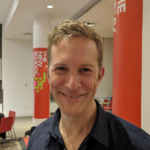
Jonathan H. Ogilvy, Fordham University, NY, NY, USA
We are pleased that Mr. Ogilvy has joined ICP as a professional associate member. We extend our warmest welcome! Mr. Ogilvy is a media and communications specialist with industry and research experience in the areas of technology and psychology. Jon balances extensive scholarly research with viable product development. Subject areas covered include General Semantics, Media Ecology, Digital Technologies and Philosophy of Mathematics. His work has been recognized with awards from The New York Foundation for the Arts, Cannes Lions, and JD Power. He holds a Bachelor of Arts in Communications from Fordham University. Mr. Ogilvy is currently conducting research with ICP members Erinn Cameron and Fiona Trend-Cunningham in the area of climate justice, violence against women, and governmental corruption.
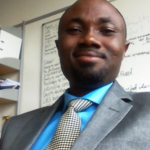
Dr. Stephen Baffour Adjei, Akenten Appiah-Menka University of Skills Training and Entrepreneurial Development (AAMUSTED), Kumasi, Ghana
We are excited that Dr. Adjei has joined ICP as a new professional member from Ghana. We extend our warmest welcome and look forward to future collaborations. Dr. Adjei is a Social/Cultural and Human Development Psychologist and a Senior Lecturer and Researcher at the Department of Interdisciplinary Studies, Faculty of Education and Communication Science, Akenten Appiah-Menka University of Skills Training and Entrepreneurial Development (AAMUSTED), Kumasi, Ghana (formerly University of Education, Kumasi campus). Dr. Adjei is also a Research Fellow at the Center for Suicide and Violence Research (CSVR), Department of Psychology, University of Ghana, Accra. He received his Bachelor of Arts degree in Psychology (Hons.) with English from University of Ghana, Accra; and his Master of Philosophy (MPhil) and Doctor of Philosophy (PhD) degrees in Psychology from Norwegian University of Science and Technology, Trondheim, Norway and Aarhus University, Denmark, respectively. He has taught, carried out research and directed programmes at universities in Africa and overseas, including Aarhus University, Denmark; Norwegian University of Science and Technology, Trondheim, Norway; University of Education, Winneba/AAMUSTED and Valley View University, Ghana. He has attended and presented papers at international conferences including the 9th Meeting of the Nordic Network for Research on Psychology and Law (NNPL) in Denmark.
Dr. Adjei is a member/an emerging leader of the American Psychological Association’s (APA) Learning Leadership Institute (LLI) and a member of the International Society for the Study of Behavioural Development (ISSBD). He is a Review Editor at Frontiers in Psychology and serves as a consulting reviewer for a number of international journals including Men and Masculinities, Journal of Interpersonal Violence, Victims and Offenders, Violence Against Women, Journal of Urban Affair, Journal of Social Issues, Urban, Planning and Transport Research, Journal of Applied Communication and Frontiers in Psychology. Dr. Adjei applies his research to understand the interactional complexities between culture, context and psychological processes, with a particular emphasis on interpersonal violence, human development and learning, agency and identity and Critical/Indigenous African Psychology. He has published several scholarly articles. You can find more information about his work here https://www.researchgate.net/profile/Stephen-Adjei

Patrick A. Robertson, Fuller Theological Seminary, California, USA
ICP wishes to extend a warm welcome to one of our new student members, Patrick A. Robertson. Patrick is a first-generation university student and a first-year doctoral student in clinical psychology at Fuller Theological Seminary. He recently completed a BA in Psychology at California State University, Channel Islands (CSUCI). During his time at CSUCI, Patrick conducted independent research with three different professors and presented posters at the Western Psychological Association Conference in 2021 and 2022. He also presented a poster at the National Conference for Undergraduate Research in 2022 and received an award for an Outstanding Research Presentation at the CSUCI Annual Research Conference. To date, Patrick has investigated constructs such as empathy, self-compassion, and help-seeking attitudes in college students. However, Patrick’s main research interest is in the field of international disaster psychology. Having volunteered with individuals in Santa Barbara recovering from childhood trauma and maladaptive coping strategies, Patrick’s experience and passion have led him to begin to investigate post-traumatic growth and resiliency in survivors of displacement. At Fuller, Patrick will be partnering with Dr. Lisseth Rojas-Flores in her ongoing work testing and developing trauma-informed care strategies to serve internally displaced peoples in Bogota, Colombia. As a student member of both APA Division 52 and the International Council of Psychologists, Patrick hopes to build a career serving acutely vulnerable populations throughout the world. He intends to create safe places for trauma-survivors to recover a sense of identity and purpose. His current research profile can be accessed through Research Gate.

Moving Forward: The NGO Committee on Migration
Eva Sandis,Ph.D., Professor Emerita, Fordham University
When I came across the announcement that the theme of the ICP Newsletter’s summer 2022 issue would be “displaced people and migration” and that “this is your chance” to make a contribution, I could not resist the opportunity, as a refugee, as one of the three founding mothers of the NGO Committee on Migration, and as a longtime representative of ICP at the United Nations– to give you a brief account of the Committee and its work here at the UN in New York. If you have time to spare, we warmly welcome you as collaborators in our work on behalf, and with, migrants, refugees, and displaced people worldwide.
Members and Focus
The NGO Committee on Migration was founded in 2007 in conjunction with the first-ever UN General Assembly High-Level Dialogue on Migration, spurred on and presided over by Kofi Annan, the then UN Secretary-General. Originally a subcommittee of the NGO Committee on Human Rights, we were encouraged, based on our contributions to the High-Level Dialogue, to become an independent, fully accredited NGO Committee, and with the support of 20 established NGOs and CoNGO, we did.
Our membership grew rapidly over the years to its current membership of some 50 NGOs accredited to the United Nations, plus a number of individual supporting members. Many of us are migrants, refugees, or have family members who are migrants or refugees. Our members include humanitarian and religious organizations, women’s and child rights NGOs, and professional and academic organizations of social workers, nurses, legal experts, and psychologists, among them the APA, SPISSI, and, of course, ICP.
The Committee also appreciates the interest in the work of members of the Psychology Coalition at the United Nations (PCUN). Colleagues Elaine Congress, Janet Segal, and Elizabeth Kloner have taken part in the Committee’s monthly meetings; Michelle Bell and Olivia Friedman are active members of our Subcommittee on Children in Migration; and Coranne Okorodudu, Rashmi Jaipal, and Leslie Popoff play a vital role as members of the Subcommittee to combat Racism and Xenophobia.
ICP representatives submit periodic reports about the Committee’s activities to the ICP Newsletter and at a special session of ICP’s annual Convention- recently virtual due to the pandemic—entitled ICP at the United Nations. In turn, ICP signs on to Committee statements that reflect ICP’s interests, including those our Committee produces jointly with other leading organizations and networks on the global Civil Society Action Committee. We circulate these statements — for example, on Ending Child Detention and on Protection of Trafficking Victims — .to UN Member States for their urgent attention and action.
A Liaison Committee
Since its founding, the Committee has been resolved to provide a venue for civil society organizations worldwide to engage directly with Member States and other UN entities to find solutions for the problems facing migrants and refugees; and to accomplish this objective by bringing to the attention of governments the voices of migrants and refugees on the ground, and seeking responses to these voices through conversations, partnerships, and solutions by and with governments. This liaison function is a hallmark of the Committee’s mode of operations, whether in its monthly programs, visits to the Permanent Missions of UN Member States, and interactions with UN entities and civil society networks. Today the NGO Committee is widely recognized as the principal liaison committee on migration issues at UN Headquarters in New York.
Priority Issues
The NGO Committee has, from its beginnings, focused on the protection of migrants and their human rights in accordance with the UN Charter. Our advocacy activities encompass assistance to migrants in vulnerable situations, especially migrant and refugee children:
- · in countries of origin as a result of climate change and displacement;
- · in transit because of mixed migration, border closings, smuggling, and trafficking;
- · and in countries of destination, coping with racism and xenophobia, lack of access to services, especially health and education, detention, and the endemic traumas –often multiple and serial- associated with these.
The Mental Health Connection
Indeed, almost all the circumstances that migrants face can, and often do, generate depression, trauma, and mental health crises among refugees, migrants, and their families, especially those vulnerable prior to migrating—and genuinely forced to migrate– because of persecution, poverty, family separation, etc. Accordingly, the NGO Committee pushes for mental health solutions to assist those in need of competent care, along with solutions that eliminate the circumstances that cause the suffering.
Advocacy on the Global Compact for Migration (GCM): Adoption, Implementation, and Review
Progress in achieving the Committee’s priorities has been inextricably intertwined with the development and implementation of the first-ever Global Compact for Migration, adopted overwhelmingly by UN Member States in 2018. Our Committee has been at the forefront of uninterrupted advocacy on the GCM — as States negotiated it between 2016 – 2018, the implementation of its 23 objectives during the last four years, and these past months in the first official review of that implementation at the UN General Assembly. A quick glance at the GCM’s 23 objectives clarifies the GCM’s comprehensiveness and centrality to global governance of migration for the benefit of migrants and governments alike. It covers factors that motivate migration, the movement itself, and post-migration settlement, emphasizing the human rights of migrants regardless of location or status, obligations of States to promote those rights and address vulnerabilities, and contributions migrants make to development in countries of origin, transit, and destination.
Our Committee carried out some 50 Mission Visits involving direct talks with Governments in every world region to support the objectives and passage of the GCM. At the adoption conference, we circulated a Compendium of Good Practices, which included 40 policies and practices that serve to achieve Compact goals. One example is the Mercy First program Start with Hope, implemented since 2014 by the Sisters of Mercy, US. Office of Refugee Resettlement, NY. State Office of Mental Health and NY State Office of Children and Family Services provides trauma-informed services to highly vulnerable unaccompanied minors from Central America who have crossed our southern border while working to reunite them with their families.
The International Migration Review Forum (IMRF) and Beyond
The first-ever global review of progress in GCM implementation since its adoption in 2018 took place from May 16 to May 20, 2022, in New York at UN Headquarters, where the week-long IMRF was held. In the months leading up to the IMRF, the NGO Committee on Migration again undertook over 24 Mission Visits and used numerous other occasions for direct talks with governments, pushing for a forward-looking outcome of the meeting and beyond. The Committee also worked jointly with other members of the Civil Society Action Committee to produce a set of global civil society priorities, entitled 12 Key Ways for States to Get Back on Track.
We also devoted much time monitoring and contributing language to the five drafts of the intergovernmental-negotiated Progress Declaration –- the Outcome Document of the IMRF. While acknowledging some progress on Member States’ commitments to the best interests of the child, combatting trafficking in persons, and fostering inclusion, we fought but ultimately were disappointed at key language that was watered down by the last draft, as well as the indications of frequent lack of basic services, especially health care during the pandemic, to migrants regardless of their migration status; lack of safe and regular pathways for forced migrants and family reunification; and even criminalization of humanitarian assistance.
While pleased by the consensus adoption of the Declaration, indicating a reaffirmation of Member States’ commitment to achieving the objectives of the GCM, we are disappointed by the lukewarm endorsement by the United States, followed by several other governments citing national priorities as the basis for exceptions and reservations.
Moving Forward
For our Committee, there is a clear call to move forward from the IMRF and engage in a strong, united civil society advocacy on behalf of a future that leaves no one behind. Therefore, we plan to continue direct talks with governments interested in partnering with civil society to find solutions to the needs of migrants, refugees, and displaced persons. We are convinced of the need for a strong emphasis on protecting migrants in vulnerable situations, especially those in mixed migration movements, and strongly agree with the call of over 150 Mayors and city leaders, in their Marrakech Declaration of 2018, vigorously renewed at the IMRF, for the interaction of the Global Compact for Migration and its 2018 sister, the Global Compact on Refugees, implementing them “in unison.”
Finally, we invite governments to deepen our joint focus on climate-induced migration, and to strengthen the participation of migrants, refugees, diaspora, and civil society organizations in decisions about migration governance, because we are key to understanding realities on the ground essential to identifying and achieving concrete solutions, in line with the motto: nothing about us without us.
ICP welcomes hearing from you so that we can publicize member activities. Please send references to your publications, talks, and honors to newsletter@icpweb.org with the tagline “Member News.”
Member Awards & Honours
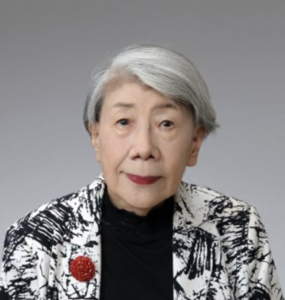
Machiko Fukuhara received the IAAP Distinguished Professional Award in 2022.
Her citation reads:
Dr. Fukuhara has a long and distinguished career as a Japanese academic and as a vital, moving force in organized psychology, both in Japan and internationally. She played an important role in the building of counseling psychology in Japan with her introduction of Microcounseling as a model and practice, and has been involved in international collaborative research, for example with Dr. Charles Spielberger on State-Trait Measures of Anxiety, Anger, Curiosity, and Depression. Dr. Fukuhara has served in many professional roles,
including Director of the Japanese Association of Microcounseling, Director of Psychoeducation Institute in Japan, and President of the International Council of Psychologists. She is currently is Honorary Professor with the Tokiwa University in Mito City in Japan.
In each of these roles, as well as service on boards and committees for a range of organizations, Dr. Fukuhara’s approach is generative and expansive. She focuses on expanding psychology’s role and impact, graciously involving a broad range of colleagues in common work. She finds mechanisms for increasing international understanding – through leadership in promoting collaboration and through generosity in establishing awards to celebrate a history of scholarship and service, and to promote the development of a new generation of international scholars.
Dr. Fukuhara has a long history of serving organized psychology. Her service to ICP, in which she has been a member since 1964, includes Area Chair; Director-at-Large; Treasurer; and President. She was also a key organizer for a 1990 ICP conference in Tokyo and a 2016 ICP conference in Yokohama. Her service to IAAP includes two terms on the Board of Directors. Dr. Fukuhara was made an IAAP Fellow in 2014 in recognition of her contributions to applied psychology.
On a personal note, Dr. Machiko is gracious, generous, and kind in her interactions with her colleagues. She is also very motivated. She rarely misses a meeting, and strives to work for the betterment of psychology and humanity. Her dedication and commitment to a psychology that is inclusive across the world and that is accessible to everyone regardless of their career stage is an inspiration to us all.
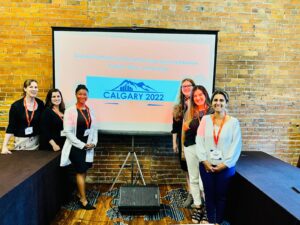 Fiona J. Trend-Cunningham was awarded the North Star Student Award at the 83rd convention of the Canadian Psychological Association in Calgary, Alberta for her meritorious contribution to the North and Rural section program as chair of the following panel, which addressed social justice and inclusion in doctoral training for clinical psychologists:
Fiona J. Trend-Cunningham was awarded the North Star Student Award at the 83rd convention of the Canadian Psychological Association in Calgary, Alberta for her meritorious contribution to the North and Rural section program as chair of the following panel, which addressed social justice and inclusion in doctoral training for clinical psychologists:
Trend-Cunningham, F. J., Cameron, E. C., Parisi, T., Jiwani, A., Salonia, C., & Harris-Britt, A. (2022, June 17-19). A distributed model of clinical psychology doctoral education: A square peg in a round hole.
Erinn C. Cameron was awarded the 2022 Student Travel Award by the Research Council of the Society for Prescribing Psychology, APA Divison 55, for her research entitled “Cannabis delivery method usage patterns and preferences for women with chronic pain.” Erinn’s research is based on her dissertation work that serves to advance clinical psychopharmacology with a primary focus on health equity for women.
Article Briefs
Migration in Context: Micro-credential Offers Transformational Experience Through Service-Learning Projects
Stephanie E. Beckman, Jerell B. Hill, Breeda M. McGrath, & Patricia H. A. Perez
Abstract
In the spring of 2022, TCS Education System hosted a micro-credential entitled Education Beyond Borders: Migration in Context (Berlin). The program introduced participants to a three-week experience in collaboration with a diverse range of colleagues involved in migration in Berlin. The micro-credential included reading and writing about scholarly literature, synchronous and asynchronous peer interaction opportunities, synchronous meetings with partners in Berlin, and a service-learning project that supports non-profits that work with immigrants within the U.S. This article is written from multiple perspectives and explores one cutting-edge way for educational institutions to expose their students to the concept of migration. The micro-credential included hands-on experiences with the reality of migration through applying various social justice frameworks, expert consultation and collaboration, and a commitment to service-learning.
Migration in Context: Micro-credential Offers Transformational Experience Through Service-Learning Projects
A common vision uniting higher education is advancing student success and impacting global communities. TCS Education System, a nonprofit system of colleges, carries a commitment and passion for preparing innovative, engaged, purposeful agents of change who serve the global community. Teaching and learning at TCS focuses on adult learners (andragogy) and an experiential approach to cross-cultural skill development. Across affiliate colleges, TCS engages in a variety of international programs and projects that include short-term study abroad courses (credit and non-credit), required international field experience courses, student exchange programs, international partnerships across universities, service-learning projects, and collaborative research and teaching projects between faculty and students across the world.
Public health restrictions on international travel during the COVID-19 pandemic led to the cancellation of international education initiatives across the world. At TCS, the pandemic restrictions spurred a creative pivot to a model of education abroad similar to the Collaborative Online International Learning (COIL) approach. Rather than abandoning international initiatives in the face of restrictions, TCS decided to increase access and broaden its vision, making international education accessible to more students. The response to this new opportunity was overwhelming and reinforced the school’s vision to internationalize teaching and learning as an essential element of higher education.
One such initiative is Education Beyond Borders, a series of international micro-credential experiences. The Education Beyond Borders course has been a multi-year, multi-school collaboration that focuses on a specific United Nations (UN) Sustainable Development Goal (SDG). In 2022, Education Beyond Borders: Migration in Context (Berlin)(EBB-Berlin) explored migration and associated sociocultural issues within local (US) and global (Berlin, Germany) contexts through the lens of UN SDG 10: Reducing Inequalities (United Nations, 2022). A range of psychological, intercultural, developmental, educational, and socio-economic frameworks were used to consider current migration issues. Partners in Germany provided support and engaged in collaborative projects to develop experiential learning opportunities. This paper will describe what made EBB-Berlin a transformational experience from the perspectives of administrator, faculty, and student.
Global Service-Learning for Social Justice: Dr. Jerell B. Hill (Pacific Oaks)
The global perspective on education requires resources and a democratic view that is globally inclusive. Since the United States is diverse, the emphasis should be on expanding democratic ideals. Learning needs to emphasize diversity, inclusion, and social justice to develop responsible citizens. The model for a democratic learning experience implies a strong meaning of inclusion and political equality when implemented, increasing the likelihood that democratic decision-making processes will promote justice. The intentionality behind the model increases shared decision-making. Authority and power are legitimized by including the perspectives of multiple voices so that those who govern follow the same rules as the governed.
The EBB-Berlin micro-credential service-learning model allowed participants to center humanity and develop critical humility that reflects core beliefs, attitudes, and actions (Sealey-Ruiz & Greene, 2015). The inclusion of social justice pedagogy allowed participants to develop the skills to speak up when necessary to intervene in the face of inequities. Similarly, cultural competency growth occurred from the willingness to learn about other cultures and accept change when necessary. Cultural proficiency allowed groups to respect the perspectives of others, see differences, and respond positively and affirmingly, esteeming the culture. Multiculturalism is knowing how to learn about individuals and their cultures while interacting effectively in various global environments (Banks, 2010). Understanding culture was the first step in accomplishing goals and differentiating individual and group needs. Leadership connects the leader and the follower and can express a vision, influence others to achieve results, and encourage team cooperation (Banks, 2014). The window on diversity promoted by EBB-Berlin developed culturally proficient leadership in its participants. Having the skillset to help develop a globally just society requires building internal capacity while producing positive outcomes.
Flexibility to Meet Changing Needs: Dr. Patricia H. A. Perez (TCSPP)
Given the changing global landscape due to the pandemic, man-made and natural disasters, and crises, higher education programs have been challenged to meet the needs of prospective and enrolled students (Clay, 2020). Faculty around the world have gained skills and competencies in adapting their curricula to virtual formats and online learning as students, depending on their root country, have been unable to travel but still needed to meet their chosen degree requirements or to gain additional training internationally for competitive job markets. More than ever before, students have also been drawn to short courses and micro-credential programs to build necessary skills through real-world application.
The EBB-Berlin program, which focused on “Migration in Context,” is an example of how participants come together as a cohort to address pressing global concerns focused on the Ukrainian and other refugee crises. Within a virtual learning platform, participants were able to participate live or view recordings of guest speakers who were knowledgeable of the crisis in Berlin even if we were unable to travel there. Participants examined research and participated in faculty-identified discussion spaces to spark conversation in the local communities and in Berlin. At the completion of this program, participants were able to contribute to identified organizations a service-learning project of their interest to give back to communities (Jacoby, 2015).
The service-learning projects supported the Young Center for Immigrant Children’s Rights (Young Center, 2022) and the Interfaith Community for Detained Immigrants in Chicago (ICDI, 2022). Project options included preparing:
- a literature summary on the impact of detention/institutionalization on immigrant children,
- a summary of best practices for cultural awareness and sensitivity in working with immigrant children,
- research on trauma-informed care to support advocacy for unaccompanied minors,
- feedback on organizational social media materials, or
- support materials for organizational fundraising.
Each of these projects was focused on organizational need and were grounded in the theory, best practice, and cultural sensitivity discussed throughout the micro-credential.
Transformational Learning Online in Three Weeks: Stephanie E. Beckman (TCSPP)
The EBB-Berlin (TCS Education System, 2022) micro-credential was transformational as a doctoral student for several reasons. In just three weeks, we participated in a theoretical and contextual overview of migration in Berlin, collaborated with global and German migration experts, engaged with peers, and developed a service-learning project.
The opportunity to hear from people directly involved in global migration work and immigration policy in Germany brought these theories to life. We worked with Omar Hernandez, the Public Immigration Officer and Program Manager at the United Nations. Within the framework offered by SDG 10 “Reduced Inequalities” (United Nations, 2022), we considered international refugee rights and international humanitarian law. By considering migration through inequalities and human rights lenses, we were better able to understand the push and pull factors contributing to migration in Germany. We also worked with Guntram Kaiser, a consultant from Germany. His historical and political knowledge of immigration policy contextualized current challenges due to the influx of migrants from several global regions within the complexities of Germany’s immigration system. Finally, we had an on-ground perspective thanks to Lea Melle, a volunteer, who provides psychological support for Ukrainian refugees and aid workers in Berlin. Her detailed description of the situation in-country allowed us to understand the urgency of the situation while also exploring the cultural sensitivity needed to support migrants.
The most impactful element of the experience was the service-learning project. For my project, I analyzed and provided feedback on social media for Interfaith Community for Detained Immigrants (ICDI). This involved carefully examining and reading each page of its website to understand its mission, vision, values, and organizational structure. I reviewed professional and scholarly literature to determine best practices for non-profit social media use. From there, I drafted a report with detailed analysis of each aspect of ICDI’s social media strategy, a summary in the form of a SWOT analysis, and a list of recommendations and resources.
In sum, the EBB-Berlin micro-credential was transformational for me, despite its brevity. Each week was packed with theoretical content, enlightening discourse, insider perspectives, and opportunities to apply my learning to an organizational project. Each of these elements has supported my development as an international psychologist in training; moreover, my service-learning project allowed me to see myself as an international psychology consultant with valuable skills and perspective that can contribute to an organization’s work and the betterment of conditions for migrants in Berlin and globally.
Conclusion
The EBB-Berlin program was transformational across perspectives. Administrators, faculty, and participants gained real-life experience in the flexibility needed to adapt to changing global conditions while supporting migrant populations through collaboration with global partners while co-constructing an engaging and empowering experience. Participants came away with an increased understanding of the complexities of global migration patterns, the need for cultural sensitivity in working with migrant populations, and an increased capacity to support the work of migrant-serving organizations. This model of short-term study abroad as a stackable credential increased access to international experiences for all students. Higher education institutions committed to a vision of internationalization of education and human rights should consider creating these types of accessible, low-/no-cost experiences.
References
Banks, J. A. (2014). Multicultural education and global citizens. In V. Benet-Martínez & Y.-Y. Hong (Eds.), The Oxford handbook of multicultural identity (pp. 379–395). Oxford University Press.
Bennett, M. J. (1986). A developmental approach to training for intercultural sensitivity. International Journal of Intercultural Relations, 10(2), 179–196.
Clay, R. (2020, October 1). How COVID-19 is changing psychology education. American Psychological Association. https://www.apa.org/monitor/2020/10/career-covid-changing
Interfaith Community for Detained Immigrants. (2022). https://www.icdichicago.org
Jacoby, B. (2015). Introduction to service learning. In B. Jacoby (Ed.), Service learning essentials: questions, answers, and lessons learned (pp. 1-25) San Francisco, CA, US: John Wiley & Sons.
Sealey-Ruiz, Y. & Greene, P. (2015). Popular visual images and the (mis) reading of Black male youth: A case for racial literacy in urban preservice teacher education. Teaching Education, 26(1):55-76.
TCS Education System. (2022). Migration in Context: Berlin. https://international.tcsedsystem.edu/study-abroad/education-beyond-borders/migration-in-context/
The Chicago School of Professional Psychology. (n.d.). Our model of education. Retrieved June 13, 2022 from https://www.thechicagoschool.edu/why-us/about-the-chicago-school/our-model-of-education/
United Nations. (2022). 10: Reduce inequality within and among countries. https://sdgs.un.org/goals/goal10
Young Center for Immigrant Children’s Right. (2022). https://www.theyoungcenter.org
International Psychology Book Series
Elaine Congress, Ph.D., Professor and Associate Dean for Continuing Education and Special Programs, Fordham University
 Behavioral Science in the Global Arena: Mental, Spiritual, and Social Health is the second book in a PCUN-sponsored International Psychology Series book series, with series editors Elaine P. Congress and Harold Takooshian, both of Fordham University. Endorsements for this book were provided by ICP members Josephine Tan and Florence Denmark. Additionally, ICP UN NYC representative Leslie Popoff wrote the forward, and ICP representative Elaine Olaoye contributed a chapter. This new book applies psychological science to global issues across four domains:
Behavioral Science in the Global Arena: Mental, Spiritual, and Social Health is the second book in a PCUN-sponsored International Psychology Series book series, with series editors Elaine P. Congress and Harold Takooshian, both of Fordham University. Endorsements for this book were provided by ICP members Josephine Tan and Florence Denmark. Additionally, ICP UN NYC representative Leslie Popoff wrote the forward, and ICP representative Elaine Olaoye contributed a chapter. This new book applies psychological science to global issues across four domains:
1. Diversity. In 14 concise chapters, 36 authors from 3 nations offer a panoramic view of diverse issues among the UN’s 17 “Sustainable Development Goals,” and how behavioral science is involved in SDG #3 on “good health:” mental, spiritual, and interpersonal.
2. Simplicity. Each chapter follows a simple format: an overview of its timely issue, a glossary of key concepts, study questions, and a list of references.
3. Student-oriented. By design, most (11) of its 14 chapters are co-authored by a leading expert in that specialty, teamed with a “rising star” student intern working with the UN—so the volume is suitable as a textbook for novices as well as a reference book for professionals.
4. Authoritative. This is volume #2 in the first-ever series on behavioral science at the UN, praised as a “much-needed” volume by leaders in the diplomatic and academic communities.
For more information or to purchase a copy of this book, please contact Elaine Congress at congress@fordham.edu
ICP Student Interns at the United Nations
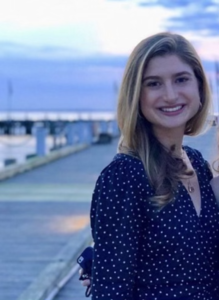
ICP student member Stephanie Friedman is currently a second-year Clinical Psychology doctoral student at Adelphi University where her research focuses on the neuropsychological changes associated with Chronic Kidney Disease and End-Stage Renal Disease. Dr. Jairo Fuertes and I are evaluating the relationship between the physician-patient relationship, social support, and treatment adherence during Covid with the aim of developing interventions that increase access to quality mental health care. Her work, both in and out of school, has focused on the nonprofit and public health sectors. As an MA student, Stephanie was a Research Assistant in Dr. Adam Brown’s Trauma and Global Mental Health Lab. During this time, she was also a fellow at the International Rescue Committee, where she supported the Research and Innovation team in synthesizing rapid evidence reviews of international projects into messaging for the Lab’s digital channels. This past year, she continued her involvement in the nonprofit world as an intern at the International Council of Psychologists alongside the Psychology Coalition at the UN. Stephanie noted that she seeks to remain connected to the international psychology community as I move into clinical work as an extern at Mount Sinai Beth Israel this summer.
Personal Statement on ICP UN Internship
Given my experience in the nonprofit sector and global mental health research, I was eager to apply to the International Council of Psychologists internship when the description first arrived in my inbox this past October 2021. Upon virtually meeting Dr. Sigal and Dr. Kloner, I felt immensely grateful for the opportunity to work alongside such inspiring role models in the field of international psychology. Through their mentorship, I soon joined the Children in Migration subcommittee of the Committee on Migration at the Psychology Coalition at the United Nations. I was offered the chance to be involved in ways I could not have imagined, including speaking on behalf of child rights at mission visits with Sweden and Canada. This invaluable experience opened my eyes to the impact psychologists can have in foreign diplomacy, beyond research and clinical settings.
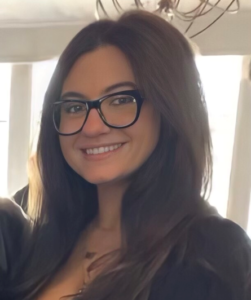
ICP student member Taylor Mulligan-Stark is a recent graduate of the Pace University Master of Psychology program (May 2022). During my time in the MA program, I was a Student Representative and a member of the Graduate Student Psychology Association of Pace University: New York City Campus (GSPA). This Fall, I will begin my clinical journey at Pace University School-Clinical Child PsyD Program, specializing in school and clinical child psychology. My current research in Dr. Sonia Suchday’s lab includes the impact of parental bonding styles on adult children’s emotion regulation and anxiety, especially in the wake of COVID-19. Previously I worked as an Associate Technical Producer for New York Fashion Week in the Live Event Industry and co-produced Fashion Week in Africa (Ghana and Uganda) through a nonprofit organization, which paved the way for my skillset to expand globally. Upon returning to school to receive my master’s degree, I was afforded the opportunity to blend my industry experience with my academic studies through interning with the International Council of Psychologists (ICP) and named co-chair of the Social Media Committee for the Psychology Coalition at the United Nations (PCUN). I also see the importance in giving back to my local community as I am a volunteer for Emma’s Place, a grief and loss center in Staten Island, New York. I am eagerly awaiting the Fall to further develop my research and clinical knowledge at Pace University.
Personal Statement on ICP UN Internship
Through Pace University, I was introduced to Dr. Florence Denmark who expanded my knowledge of the many opportunities and great work being done by the members of the International Council of Psychologists. Upon connecting with Dr. Sigal and Dr. Kloner to discuss the internship opportunity, I could hear the excitement they had for the work they were doing and how wonderful it would be if I could be surrounded by such enthusiastic, impressionable, and knowledgeable individuals. Upon acceptance into the internship program, mentorship began immediately to expand our knowledge on the missions of each of the NGOs. I joined the NGO Committee on Children’s Rights, where I attended monthly meetings, started their social media presence on Instagram, and was able to observe the work they are doing for the future of our world, the children. The monthly ICP meetings, with all members from around the world connecting virtually, were awe-inspiring. Through our monthly meetings, the planning began for the 15th Annual Psychology Day. Olivia and I were involved in all aspects of the planning stages and worked closely up until event day. We were even afforded the opportunity to ask questions during the live Q&A segment of the event! As co-chair of PCUN Social Media Committee, Olivia and I worked closely with Dr. Marcotte to revamp our presence on social media, which fostered a place for us to post upcoming events and encourage conversations surrounding climate action. Olivia and I worked closely together on the social media strategy and created a new PCUN logo all while working alongside the Psychology Day planning committee. Olivia and I were able to find a great rhythm working together, and I couldn’t have asked for a better colleague and fellow intern to work with! I feel immensely grateful to have been given so much but also to be respected and receive so much in return. Thank you to the ICP team and mentors. I am looking forward to staying connected!
Uncertain Cartographies: Climate Change and the Artwork of Gonzalo Bacigalupe
by Patrick A. Robertson & Erinn C. Cameron
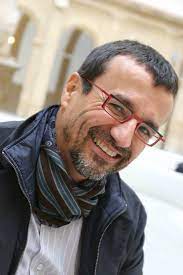
Gonzalo Bacigalupe, EdD, MPH, is a Professor of Counseling Psychology at the University of Massachusetts, Boston, and a Research Associate of CreaSur, Universidad de Concepción. Gonzalo’s academic and research work focuses on the interaction between citizen participation and community resilience in the face of disaster. He investigates the impact of COVID-19 on families and communities, health equity, trauma, and the climate crisis. He is also actively engaged in a network of professionals mobilizing to inform and adjust the COVID-19 prevention strategy in Chile.
In addition to being a researcher and disaster resilience activist, Gonzalo is an abstract artist that works with mixed media to explore various topics related to his academic work. Gonzalo started painting in 2017 after an accident resulting in a broken shoulder. His work has thus far addressed topics such as climate change and the COVID-19 pandemic as they intersect with the human experience. His work has been showcased at various exhibits since 2018, and he was awarded the Artifica Awards from Pontificia Universidad Catolica de Chile for 2018 and 2019. He also leads the UMASS Boston Latinx Arts and COVID-19 Project, and his work was recently selected for exhibition in the Boston Convention Center.
One topic explored in Bacigalupe’s artwork is climate change. His paintings map and describe interactions between the built environment and the natural environment in ways that pure numbers and raw data cannot capture. His paintings both leverage and elicit emotion, telling a story about a world with an uncertain future, a world that is facing various and simultaneous transitions. As if mapping out the natural world from a bird’s eye view, Bacigalupe uses blues and greens in a circular, “flowing” fashion to contrast with straight lines of black, grey, and metallic gold that represent human intervention or “infestation.” At the very least, the paintings allow the viewer to consider their role in either creating or destroying natural beauty and what it offers. These “uncertain cartographies” are cinematic in their use of colour, texture, and layering. They use colour and shape to map out a territory while texture and layering tell the story of the Anthropocene and its characters. Bacigalupe intends to allow his paintings to tell the truth, even when that truth is uncomfortable or emotional. His paintings invite the viewer to have a felt experience of the state of the planet and its peoples, creating an opportunity for them to gain a deeper understanding of their own place in the story.
While Bacigalupe’s paintings are a “look from above”, similar to a map of a certain territory, they are not exact representations of the land and sea they reference. Rather, each painting tells a story. Breakages in the paint or a scratchy texture may represent an aspect of the relationship between humans and the environment or even the feeling created by the outcomes of that relationship. Straight lines through an obviously circular pattern could represent human interruption in the symbiosis between land and sea. Drawing on systems theory, Bacigalupe’s paintings are maps of an abstract territory that recognize the interconnectedness of natural and societal systems. While the sudden emergence of a yellow spot may look volcanic in nature, the texture of the rippled lines next to it may speak of human intervention in the natural world. His paintings effortlessly reveal the interconnectedness of ecosystems, political systems, systems of commerce, systems of governance, and the human person. The viewer is left to draw their own conclusions and consider their own participation in the ongoing narrative the paintings reveal.
Bacigalupe’s artwork illustrates how art and scientific research can be complementary. While data that the psychological community captures and interprets is information about real people with real stories in real communities, the manner in which communities understand and interpret information has a real impact. Artwork like Bacigalupe’s’ invites citizens and researchers alike to connect with the message the data supplies in a way that is both contemplative and activating- in a way that is innately human. As a researcher that focuses on the impact of citizen participation in the face of disaster, his artwork offers a gateway for citizens to connect with some of the greatest challenges of our time.



Dr. Natividad Dayan
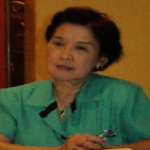
Rembrances of Dr. Naty Dayan and Commodore Roger Dayan and Regrets at Losing You Both
By Sandra Neil and Robert Silverberg
Dear Naty and Roger, we will miss you both. You were always so wonderful to us, with our experiences over the years together. We remember being together at the many ICP conferences, most notably the Manila Conference in the Philippines, with your Filipino jazz band, dancing, singing with each other, and the prominent friends and colleagues that were present. We explored the countryside together, and entered the Malinta Tunnel on Corregidor together.
Also, we especially remember the Melbourne ICP Conference, enjoyed so much, by Naty with our friendships, and by Roger through a game of golf. The Jakarta conference hosted by Sarlito saw us all promenading in safety through the crowded streets of Jakarta, escorted by young Psychology students who adopted us all. We had other wonderful times together in San Francisco, and the many other conferences we attended in your company.
You both did so much for our continuity as an international community. There were always so many important and prominent psychologists at these ICP meetings and they would not have been the same without you both.
Our condolences go to your families and colleagues, and our love to your children. Our own lives were very enriched by our decades-long relationship with you both!
Dr. Naty Dayan passed away Sunday October 24, 2021. What a great loss to ICP. She will be missed by so many of her friends and colleagues. Dr. Naty Dayan served in various positions. She was a counselor at Dayan`s Psychological Clinic and staff at the Counseling and Educational Psychology Department at De La Salle University in Manila, she was President of the Psychological Association of the Philippines, 1996-1997, ICP President 2004-2005 and she organized together with her husband Roger the 65th Annual ICP Convention in Manila, Philippines, July 1-5, 2002 and co-edited the ICP Proceedings of this conference. Her expertise comprised experiences as a teacher, clinical psychologist, and expert witness in cases involving marital nullity, temporary protection order, custody, adoption, battered wife and husband syndrome, and civil and criminal competencies.
And we had wonderful experiences in Manila and at other places where we met Naty and her husband Roger. We will never forget.
Our deepest sympathies to her family, children, and friends
Roswith Roth and Dietrich Albert
Dr. Ann Marie O’Roark

We are saddened by news of the death of Ann Marie O’Roark, a long-time ICP member and staunch supporter. She has served ICP in many roles, as president, treasurer, board member, advisor, and newsletter editor.
Note from Dr. Ann Marie O’Roark’s son, Fred Mckirachan:
“I am sad to share the news with you that Mother passed away in her home last Sunday, May 15, 2022, at the age of 88. She remained upbeat, engaged, and as sharp as ever until the end.”
Tributes to Ann Marie can be submitted to the ICP website at the following link: https://icpweb.org/tribute-to-ann-marie-oroark/
A memorial in honour of Ann Marie from ICP past presidents will appear in the Fall issue of the ICP Newsletter.
Erinn C. Cameron
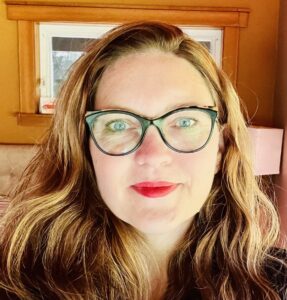 I am honoured to have been appointed as the new editor of The International Psychologist, and I look forward to continuing to serve the ICP membership in this new role. I first want to thank Ada Sinacore for her tenure as editor and her mentorship during this transition. Ada will continue on the editorial team, and we are looking forward to working together on upcoming issues.
I am honoured to have been appointed as the new editor of The International Psychologist, and I look forward to continuing to serve the ICP membership in this new role. I first want to thank Ada Sinacore for her tenure as editor and her mentorship during this transition. Ada will continue on the editorial team, and we are looking forward to working together on upcoming issues.
The Summer 2022 issue of The International Psychologist has primarily been dedicated to highlighting the urgent global issue of displaced peoples. According to 2022 UNHCR statistics, approximately 89 million individuals worldwide have been forced to leave their homes, including 27.1 million refugees, 4.6 million asylum seekers, and 53.2 million who have been internally displaced. Around half are under the age of 18, with 69% originating from just five countries, the Syrian Arab Republic, Afghanistan, Venezuela, Myanmar, and South Sudan (UNHCR, 2022). The ICP 2021 Human Rights Observation, which took place during our annual conference, also highlighted this urgent and growing global human rights issue. Much of this displacement, approximately 25 million individuals across 140 countries (UNRefugees, 2022), can be attributed to weather-related events and thus connected to climate change.
The Fall 2022 issue of The International Psychologist will expand on this topic by focusing on climate change and environmental justice. We invite you to submit your work for the Fall 2022 issue, including research in the form of article briefs (3000 words), testimonials, opinion, and informational pieces (1500 words), artwork, and poetry.
Please submit your work for consideration to Erinn Cameron at ecameron@email.fielding.edu
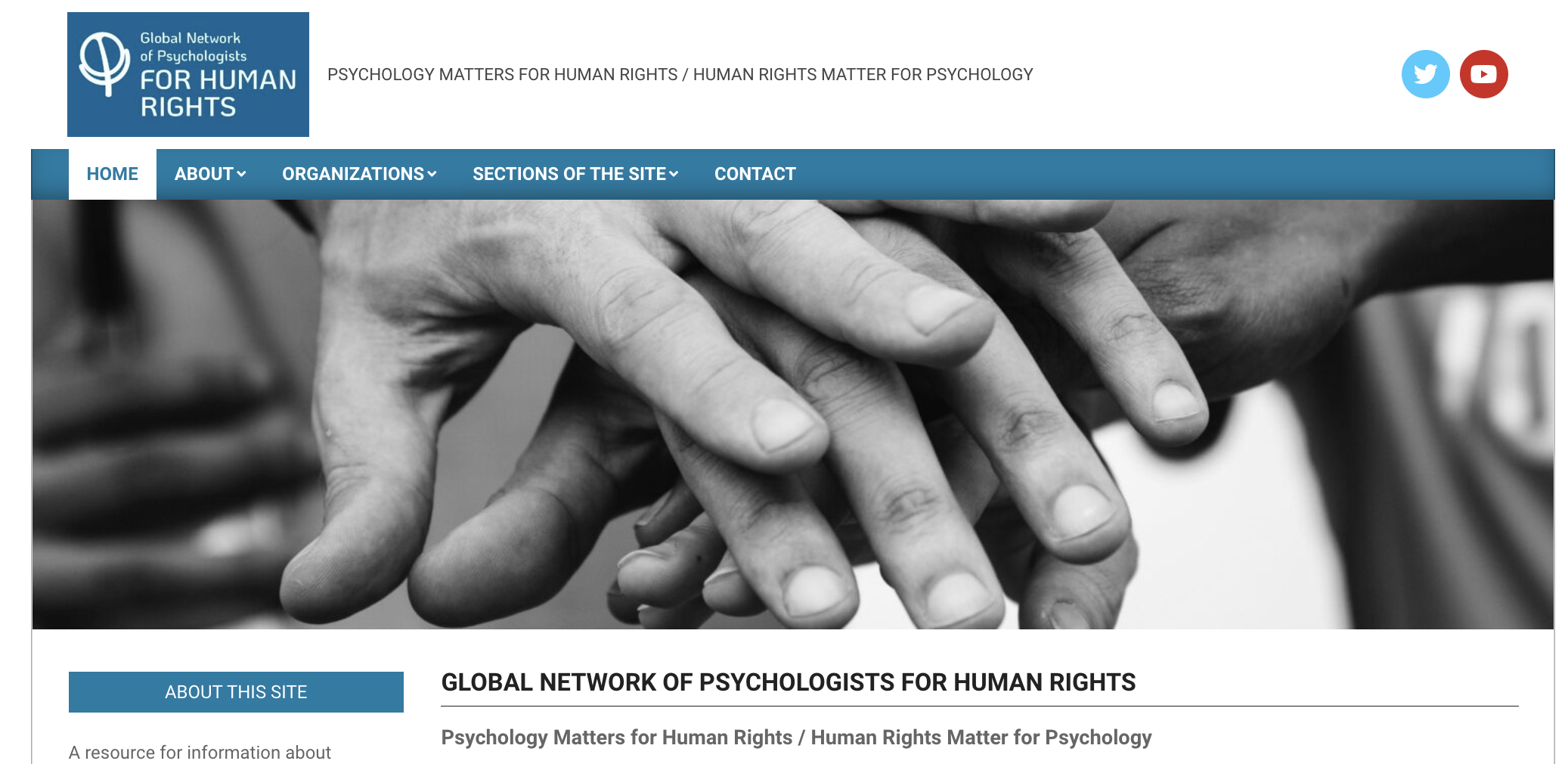
Subscribe to the Global Network of Psychologists for Human Rights
receive the monthly Bulletin, participate in webinars,
contribute to the global voice!
